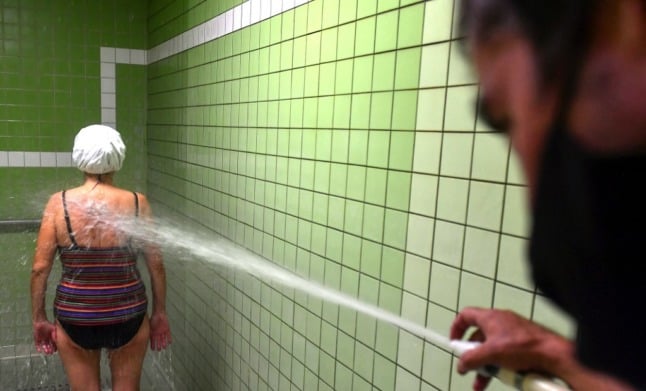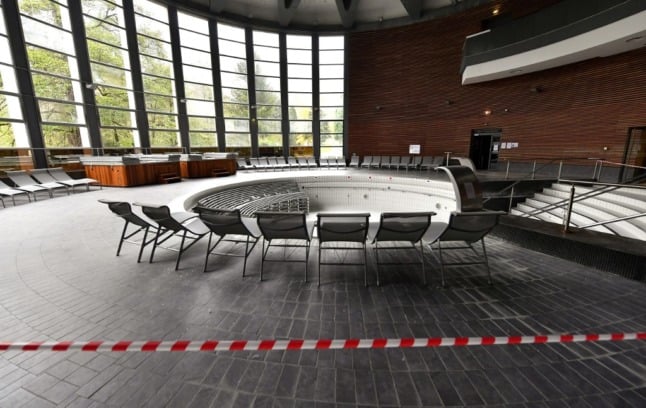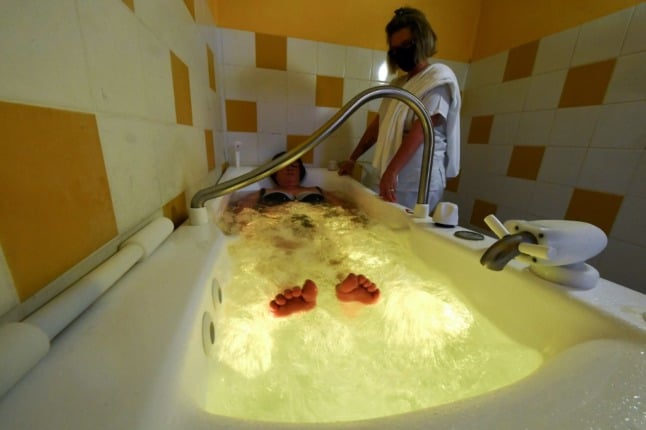How big is the thermal spa sector in France?
326,000 people visited thermal spas for treatments in 2021 according to the head of the Conseil national des établissements thermaux (National Council of Thermal Establishments). Those who visit these places are known as curistes.
There more than 100 stations thermales in France – establishments that provide medical care with heated mineral water and mud.
France has more than 770 thermal springs which provide the key ingredient for such treatments.
In 2019, there were 850 doctors specialising in delivering thermal treatments in France. That same year, 0.15 percent of reimbursement payments made by the Assurance Maladie (the French public health system) went to people who had undergone thermal spa treatments
Those representing the sector say that it employs more than 100,000 people directly and indirectly.
How does it work?
We’re not just talking a spa day here.
A cure thermale is different from thalassothérapie – the former is used to treat medical conditions and must be proscribed by a doctor while the latter is used simply to relax. If you go with a few friends to a spa for a day of relaxing and gossip with a massage, a sauna and perhaps a facial that is not a cure thermale.
You can receive treatment in a cure thermale for problems linked to rheumatology (conditions like arthritis), gynaecology, phlebology (veins), neurology, cardiology, urology, dermatology, child development, digestion, metabolic issues, psychosomatic illness, respiratory problems and buccolingual health.

The standard duration of a cure thermale treatment is 18 days, which are divided into periods of treatment, physical activity and rest.
The treatment generally begins in the morning and last between 2-3 hours. Patients will undergo 4-6 treatments per day. They can be delivered individually or as part of a group depending on the prescription given by a doctor.
The exact treatment you will receive is determined by a doctor once you arrive at a station thermale depending on your illness and overall state of health. Common features are massages, steam room sessions, mud baths and power showers.
Is there any science to support the idea that these treatments are useful?
Representatives of the cure thermale sector point to studies written by thermal medicine researchers which, surprise surprise, show thermal spa treatments to be effective in treating a whole range of conditions.
But other research has also pointed towards benefits. A paper published in the British Medical Journal found that thermal spa therapy was an effective treatment for the management of knee osteoarthritis; and other peer-reviewed studies found that the mineral water used has health benefits.
READ MORE Are the French falling out of love with spa cures?
But there are sceptics however.
“Medical benefits of thermal treatment have been observed in patients with rheumatic conditions, psoriasis, venous insufficiency, ENT conditions, gynecolgical disorders, and anxiety. Unfortunately, many publications in this area suffer from methodological flaws,” notes the French National Academy of Medicine.
A lack of control groups and financial interests behind many of the studies into the efficiency of thermal medicine means that the jury is still out on thermal spa treatments.
How can I get my spa treatment reimbursed?
You can pay for treatments yourself, but depending on your state of health the government might pay some of the costs, as the French social security system has been reimbursing cure thermale treatments since 1947.
You can get your treatment partially reimbursed by the French state if you have obtained a prescription from a doctor. You can get one stint in a thermal spa reimbursed per year, for 18 days. Reimbursement typically amounts to 65-70 percent of the cost of the treatment and is transferred into your bank account after you have paid for the treatment itself. You need a French carte vitale to benefit.
READ MORE How to get a carte vitale in France and why you need one
Thalassothérapie – the relaxing spa day – is not reimbursed.
Your doctor is the one who decides which thermal spa you should attend – each one is specialised in treating certain illnesses.
Before receiving treatment, your doctor will have to sign and provide you with this form, which must then be submitted to the Assurance Maladie (French public health system). You must also fill out a déclaration de ressources, providing evidence of your salary or any other earnings. This must also be sent to the Assurance Maladie – you can find the postal address where you must send your documents in the démarches à accomplir section of this website.
If you earn more than €14,664.38 annually, your transport costs to the treatment centre or stay at a hotel will not be reimbursed by the French state. If you earn less than this, you should submit evidence and can have 65 percent of transport (the price of a second-class SNCF ticket to the treatment centre) and hotel fees paid (up to €97.50 per day) back to you.
How has the Covid-19 pandemic affected the sector?
Covid-19 has hit the thermal spa sector hard.
The National Council of Thermal Establishments says that the number of clients receiving treatment was 43.3 percent lower in 2021 than in 2019, before the pandemic began.

Access to thermal treatment centres is contingent on being fully vaccinated (for now, not all centres require you to have had a booster); a negative PCR test taken 72 hours before entering the centre if you are unvaccinated followed by bi-weekly tests during your treatment; or proof of recovery of Covid (a positive test between 11 days and 6 months old). Mask wearing is required in communal areas of treatment centres.
Dozens of thermal spas in France have begun treating patients with symptoms of long Covid, such as loss of taste and smell, chronic fatigue and brain fog. These treatments are not currently reimbursed by French social security, but the sector is trying to negotiate a deal with the Health Ministry to make this happen.
“Thermal medicine can contribute to the management of certain after-effects of Covid-19 by a support to more efficient ventilatory mechanics and motor functions and by a relief of the stress following a prolonged stay in an intensive care unit,” said the National Academy of Medicine.
Other information
You can read more about the process of getting thermal spa treatments reimbursed here.
The National Council of Thermal Establishments has an interactive map where you can search for treatment centres by geographical area and speciality.
If you are interested about the alleged benefits of thermal spa treatments, an exhibition is currently being held at the Carousel du Louvre in Paris, until January 23rd. Tickets are free but you must subscribe to the event here.
Lyon will also hold an event bringing together thermal spa practitioners from January 28th to January 30th at the Eurexpo centre. You can get more information about that event here.



 Please whitelist us to continue reading.
Please whitelist us to continue reading.
Member comments